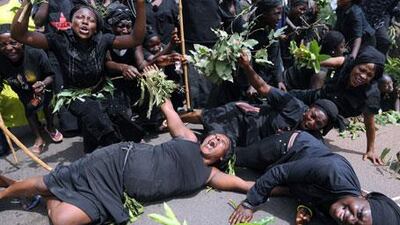NAIROBI // Nigeria continues its nosedive into political chaos and sectarian violence as ethnic clashes in the north, bombings in the south and a dissolution of the cabinet rocked the Opec member and West Africa's largest economy.
Goodluck Jonathan, the acting president, has had a full plate since taking the reins of government from Umaru Yar'Adua, the ailing leader. Mr Yar'Adua, who spent three months in a Saudi hospital for a heart ailment, returned to Nigeria last month and has not been seen in public. The Senate handed Mr Jonathan the powers to act as president while Mr Yar'Adua was away. Since then, the acting president has sought to consolidate his control.
Mr Jonathan sacked the entire 42-member cabinet last week and is expected to announce a new cabinet early this week. He is likely to reappoint about half of the sacked ministers, reports said. "The cabinet dissolution is a bid to inject fresh blood and bring in greater vigour to governance," said Ima Niboro, Mr Jonathan's spokesman. Meanwhile, hundreds of Nigerian youth took to the streets last week to protest against Mr Yar'Adua's refusal to step down officially. The peaceful demonstrators in Abuja, the capital, called for Mr Yar'Adua to either resume office or quit and make Mr Jonathan president.
Mr Jonathan has said he plans to continue Mr Yar'Adua's work of bringing electoral reform before next year's elections, tackling corruption and ending the conflict in the oil-rich Niger Delta. The government has offered amnesty to members of the Movement for the Emancipation of the Niger Delta, a rebel group that claims to be fighting for the people of the delta and their share of oil wealth. The group is known for sabotaging oil installations and kidnapping western oil workers.
Last week, the militant group exploded two bombs outside government offices in Warri, a city in the delta. The attack, which came as officials were meeting to discuss the amnesty proposal, raised fears of a renewed campaign of violence that could threaten the best chance for peace in the region for years and send the country's oil output back into decline just as it has started to recover. Unrest in the delta has cost Nigeria US$1 billion (Dh3.7bn) in lost oil revenue each month, analysts say. The country is pumping two-thirds of its capacity of three million barrels per day.
The government vowed to continue to implement its amnesty deal with the rebels, which includes training and rehabilitation for militants who turn in their weapons. "The bombing will not stop us from doing what we are supposed to do," said Ufot Ekaette, the Niger Delta minister. "We will continue to work hard to realise the programme of the amnesty. That is the best we can do under the present circumstances."
The bombings in the restive delta came as renewed Muslim-Christian violence gripped northern Nigeria. The country's population of 140 million, the largest in Africa, is almost equally divided between Christians, most of whom live in the south, and Muslims, who inhabit the north. Muslim herders disguised as soldiers last week slaughtered 13 Christians with machetes near the north-central town of Jos.
The region has been hit hard by sectarian violence since January, when 400 people were killed in clashes. Competition for increasingly limited farmland in the densely populated country has triggered the violence. Mr Jonathan, who has had to delicately balance the country's political crisis, economic mess and amnesty for the delta rebels, shifted his focus to the sectarian troubles in the north. "None of the perpetrators of the Jos crisis shall go unpunished," he said in a statement last week. "The government is committed to the sustenance of peace and stability in Jos and in the entire country."
The bloodshed in Nigeria's north also caused a diplomatic row with Libya last week. Muammar Qadafi, the Libyan president, said Nigeria should be partitioned into two states to end the violence. Mr Qadafi compared Nigeria to Pakistan, which split off from Hindu-dominated India in 1947. "The painful situation that Nigeria is enduring resembles the situation of the Indian subcontinent before 1947, at the time of the massacres between Hindus and Muslims," he said in a speech to student leaders in Tripoli, the Libyan capital.
This idea has worked in Sudan, where southern Christian rebels fought a 20-year civil war with the country's northern Muslim rulers. Southerners will vote next year on a referendum of independence. Nigerian leaders, however, did not appreciate what they saw as Mr Qadafi's meddling it their affairs. Nigeria withdrew its ambassador to Libya and the speaker of the Senate called Mr Qadafi, who led the African Union last year, a "madman".
"With all due respect, why do you want to give a madman that level of publicity?" David Mark said, according to local newspapers. "Truly, in my candid opinion, I don't think he deserves our attention." mbrown@thenational.ae

